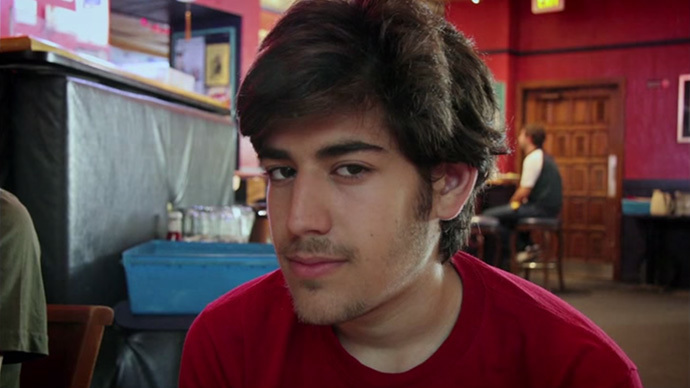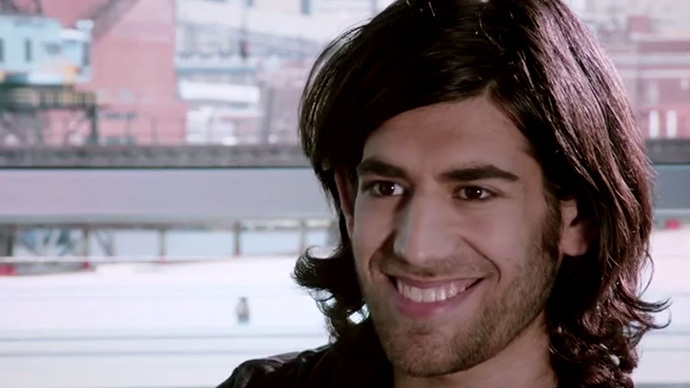‘Inspiration for people, threat to US govt’ – Aaron Swartz film director to RT
Aaron Swartz was using the Internet in a way that was “challenging” to the US govt, but by trying to make his story a deterrence for any followers, it instead made him an inspiration, the director of ‘The Internet’s Own Boy’ Brian Knappenberger told RT.
Internet hacktivists hold global ‘hackathon’ in honor of Aaron Swartz’s birthday
RT:Aaron Swartz was basically driven to suicide for standing up to the government for what he believes in. Do you think his fate will put others off following in his footsteps?
Brian Knappenberger: No. I mean I think that treatment of Aaron Swartz was awful and it was outrageous. But I actually think that if it was meant to be a kind of persecution to put people off of this kind of behavior, I think it backfired. If it was meant as deterrence, or it was meant to make an example, as the prosecution said to Aaron’s dad and to Aaron’s council, I think that effort, probably, backfired.
People are inspired, looked at what he did and are inspired by it. I don’t think that the legal efforts against him actually would put off future Aarons. And if anything they’ll inspire them.

RT:You said the US authorities made an example of Aaron Swartz. Why was the government so afraid of him?
BK: Well, the government wanted to make an example out of Aaron Swartz, and they did threaten him with huge fines, huge potential jail sentences. And they even said they wanted him to be used as a case for deterrence.
I think the government was afraid of Aaron because he was able to use networked worlds and information, and use the Internet in ways that was challenging. One of Aarons insights, I think, was the understanding that when you take the academic research, knowledge or transparency about our government and put that behind a paywall – essentially what you are doing is you are cementing a stratified class structure. And he was challenging to that notion. And that was threatening.
RT:Aaron Swartz was a celebrity within the Internet community. But how well-known is he outside that relatively small circle?
BK: Before Aaron died he was a kind of celebrity in the internet world. But I think that since he died so many people from far beyond the internet communities really responded to his story. And so that’s part of what ‘The Internet’s Own Boy’ has done: it’s explored why people far beyond tech communities really responded to who he was. And I think you see that in a huge response to the film and in the discussion that continue about Aaron.
Well, it’s absolutely amazing and this is an example of how Aaron Swartz’s insight and ingenuity lives on. There are ‘hackathons’ going on now all over the planet, 11 cities on the planet. People are turning up to put their skills to things that they think will be useful; to put their skills in the service of the public good. So each individual ‘hackathon’ is, you know, looking at something different. But it’s really a sign of how his, sort off, legacy, kind off, lives on.
RT:What are they trying to achieve with these hackathons?
BK: Well, every city is doing something different. So, people show up and they have different goals in mind. But it all has to do with the kinds of things that Aaron was fighting for, which is freedom of information; freedom of knowledge; ways of using technical means, network systems to, sort of, organize political change or grassroots movements. It’s all along the lines of the kinds of things that Aaron was fighting for when he was alive. But each individual city and each individual ‘hackathon’ is, sort of, choosing their own path.

RT:Do you think this movement will get stronger with time?
BK: Actually, there was one last year at this time and this year its much-much bigger, so it does appear to be growing. I think that the film ‘The Internet’s Own Boy’ has really touched a nerve with people around the world. And they look at Aaron’s story and see that it’s a kind of a story about what kind of internet we want now.
Do we want an internet where corporations, basically, extract our private data from us and sell it for pennies as their main business model? Do we want an internet where governments are able to surveil us and, sort of, use these network worlds against us? Or do we want this to be a free exchange of information? Do we want internet that connects people, that encourages innovation and political discourse, encourages to understand what kind of government we want? How to best govern ourselves and a way to claw ourselves back from oppressive regimes around the world?
RT:It's been almost a year since Swartz's tragic death. In that time has the world come any closer to his dream of open information? Has anything changed?
BK: There’s a couple of things that we were really hoping would be changed after Aaron died. One of which was the change to this awful law in the United States called the Computer Fraud and Abuse Act, which basically criminalizes anything that people just don’t like that people are doing online. And it has all kinds of broad implications for people. We are trying to get it changed, there was an effort called Aaron’s Law, but it’s basically stalled in Congress.
So in terms of the actual legal changes that we were hoping for not much has changed. But in terms of people being inspired by what Aaron did – that I see a lot of change on, and I think that best evidence for that is what’s happening today. Eleven cities all over the world, people are turning up to be a part of these hackathons and pursue some of the things that Aaron carried about.
The statements, views and opinions expressed in this column are solely those of the author and do not necessarily represent those of RT.












